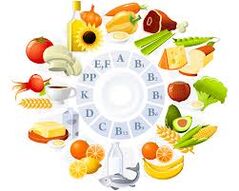
Everyone knows that vitamins are necessary for our body, but few people understand that these substances are necessary for the proper functioning of the brain. In addition, certain groups of vitamins are needed to preserve memory and thinking, which will be discussed below.
The most important B vitamins for memory
B vitamins are essential for the nervous system. We can say that the representatives of this group have the greatest influence on human memory and thinking. They support the work of nerve cells, as well as prevent premature aging, protect the brain from overload and stress. Low or absent B vitamins cause severe disorders of the nervous system, reduce human memory and intelligence.
This group of vitamins includes the most important brain vitamins - B1, B2, B3, B5, B6, B9, B12.
Thiamine - Vitamin B1
Thiamine is a vitamin B1 called "vitamin of the mind, " which has the greatest effect on mental ability and memory. It is lacking, thoughts begin to confuse and memory weakens. Vitamin B1 directly protects the nervous system and is involved in supplying the brain with glucose.
Following a complete diet, a person does not lack this vitamin, because it is found in many products: oats and buckwheat (many of which contain grains and shells), bran, peas, nuts, carrots, radishes, beans, potatoes, spinach - are tiamin.

It is well absorbed, but also rapidly and decomposes, especially when exposed to alcohol, nicotine, sugar, tea tannins.
Vitamin B1 deficiency causes symptoms:
- memory loss;
- muscle weakness;
- severe physical and mental fatigue;
- impaired coordination and gait; dissolution of
- limbs;
- unreasonable irritability;
- depressed mood;
- tearing and anxiety;
- sleep disorders.
In severe cases, polyneuritis, limb paralysis and paresis may develop. Cardiovascular function is also impaired, and changes in the gastrointestinal tract (faecal disturbance, constipation, nausea) are observed.
Riboflavin - Vitamin B2
Vitamin B2 - riboflavin is an "energy vitamin", an accelerator of energy and metabolism in our body, including accelerates the mental processes in the brain, is involved in the synthesis of nerve cells and neurotransmitters (biologically active substances that transmit nerve impulses) in the brain cells. It is lacking, and sport will bring fatigue, not energy and activity. Vitamin B2 tolerates high temperatures well, but decomposes rapidly in light.
Riboflavin is supplied from meat and dairy products. These are liver, kidneys, eggs, dairy products, yeast, tomatoes, cabbage, rosehips.
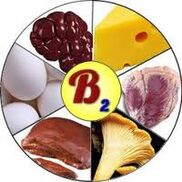
Vitamin B2 deficiency causes:
- headache;
- Decreased speed of mental processes;
- drowsiness;
- loss of appetite;
- weight loss;
- weakness.
In addition, skin changes such as sores and cracks in the corners of the mouth (cheilitis), chest and facial skin dermatitis; visual disturbances - photophobia, tearing due to inflammation of the cornea and mucous membranes of the eyes; impaired adrenal hormone synthesis.
Nicotinic acid - vitamin B3 or PP
Nicotinic acid (nicotinamide, niacin) - vitamin B3 - can be called a 'resting vitamin'. Vitamin is involved in the synthesis of enzymes and helps to extract energy from food, it is lacking, the body experiences fatigue, depression, depression, insomnia. In addition, nicotinamide is directly involved in the biosynthesis of hormones (estrogen, progesterone, cortisol, testosterone, insulin, and others).
High levels of vitamin B3 are found in products of animal origin: liver, eggs, kidneys, lean meat; slightly less vegetable products - asparagus, parsley, carrots, garlic, peas, pepper.
If it is not in the food, a pelagra develops. The main symptoms of this condition are diarrhea (diarrhea), dermatitis (inflammation on exposed skin surfaces) and dementia (acquired dementia).
Pantothenic acid - vitamin B5
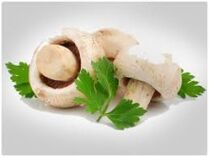
Vitamin B5 - Pantothenic Acid - This vitamin is found in many foods. This vitamin is involved in fat metabolism, transmitting nerve impulses, as well as triggering skin regeneration mechanisms. It was previously thought that a person cannot be deficient in this vitamin.
However, given that more than half of pantothenic acid is digested during storage and production, the following symptoms may occur:
dissolution of- limbs;
- memory impairment;
- sleep disorder;
- headache;
- hand and foot paresthesia (tingling);
- muscle pain.
To supplement your vitamin B5 deficiency, you should include a variety of foods in your diet: meat, healthy sprouted grains, hazelnuts, offal, yeast. Significant amounts are in legumes, fresh vegetables, mushrooms, green tea.
Pyridoxine - Vitamin B6
Vitamin B6, pyridoxine, is involved in the synthesis of neurotransmitters, including serotonin. Therefore, its other name is "vitamin antidepressants".
Deficiency causes the following symptoms:
- drowsiness;
- irritability;
- suppression of thinking;
- depression;
- feeling anxious.
Vitamin B6 is abundant in yeast, grains, legumes, bananas, meat, fish, potatoes, cabbage, peppers, cherries and strawberries.
In addition, vitamin B6 affects metabolism, cardiovascular condition, immunity, skin condition, synthesis of hormones, hydrochloric acid in the stomach, and absorption of vitamin B12.
Folic acid - vitamin B9
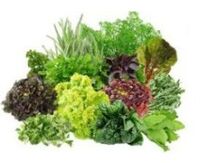
Folic acid - vitamin B9 - is involved in the synthesis of neurotransmitters, including dopamine and serotonin, that is, it acts on the excitation and inhibition of the central nervous system. Vitamin B9 is also involved in the exchange of proteins, transmitting genetic information during fetal development, it is essential for the formation of normal blood cells. Together with vitamin B5, it slows down the graying of the hair.
If missing, symptoms include:
- memory impairment;
- fatigue;
- feeling anxious;
- anemia;
- Insomnia and apathy.
Large amounts of folic acid are found in fresh dark green vegetables (asparagus, spinach, lettuce), a lot of them are in beans, wheat, avocados, to a lesser extent - in the liver, egg yolk.
Cyanocobalamin - Vitamin B12
In nature, it is synthesized only by microorganisms, bacteria, cyanobacteria and accumulates mainly in the liver and kidneys of animals. Neither plants nor animals synthesize it. This "red vitamin" is found in animal products: fish, liver, kidneys, heart, oysters, it is also found in seaweed, soy. Vitamin B12 helps our body transition from wakefulness to "sleep" mode to normalize mental processes, shifting short-term memory to long-term.
Cyanocobalamin deficiency causes:
- chronic fatigue;
- confusion;
- hallucinations;
- tinnitus;
- irritability;
- dizziness;
- drowsiness;
- memory loss;
- visual impairment;
- dementia;
- depression.
In addition to B vitamins, there are other vitamins for memory and thinking.
Ascorbic acid - vitamin C
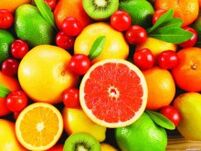
Ascorbic acid is a very strong antioxidant and protects the body's cells from oxidative processes. Needed to support the work of brain neurotransmitters.
Vitamin C is not synthesized in the body, it is obtained with food: rosehips, black currants, sea buckthorn, parsley, sweet red peppers, citrus fruits, green onions, cabbage, horseradish, nettles, from animal products are only in the liver.
Tocopherol acetate - vitamin E
This fat-soluble vitamin is primarily an excellent antioxidant that removes toxins and free radicals from brain tissue. It is included in the lipid composition of cell membranes. A diet rich in vitamin E foods helps protect the body from heart attacks and atherosclerosis, thus preventing the development of dementia.
This requires the diet to include unrefined oils (olives, soybeans, corn), as well as green peas, wheat and rye sprouts, beans, green salads, lentils, and oats.
Calciferol - Vitamin D
Involves the body in food and is synthesized in the skin when exposed to ultraviolet light. Calciferol is the main conductor of calcium metabolism in the body. In addition to important effects on bone and tooth formation, cell growth, and development, vitamin D is required for proper transmission of nerve impulses and muscle contraction.
Contained in large quantities in products of animal origin: butter, fatty fish (herring, tuna, salmon, mackerel), fish oil, liver, egg yolk.
Bioflavonoids - Vitamin P

The main effect of vitamin P is to reduce capillary permeability and fragility. Together with ascorbic acid, it protects the body from oxidative processes. This prevents bleeding in the brain. Rich in vitamin P citrus fruits, rosehips, black chokeberries, green tea, apples.
In addition to a balanced diet and vitamin intake, there are other ways to avoid dementia. This is the only way to achieve good memory, energy and optimism in old age.









































































